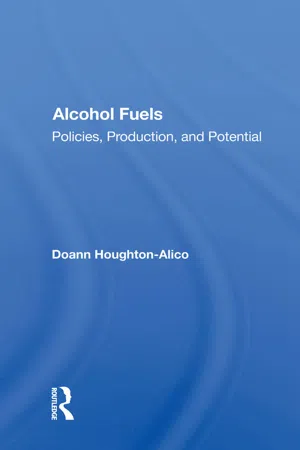
This is a test
- 288 pages
- English
- ePUB (mobile friendly)
- Available on iOS & Android
eBook - ePub
Book details
Book preview
Table of contents
Citations
About This Book
Since the 1973 OPEC oil crisis, the rise of imported crude oil prices, and the questionable availability of petroleum supplies, the United States has been forced to investigate liquid-fuel alternatives. Alcohol fuels, including methanol and ethanol, offer the most realistic near-term potential as gasoline extenders or substitutes. This book is the
Frequently asked questions
At the moment all of our mobile-responsive ePub books are available to download via the app. Most of our PDFs are also available to download and we're working on making the final remaining ones downloadable now. Learn more here.
Both plans give you full access to the library and all of Perlego’s features. The only differences are the price and subscription period: With the annual plan you’ll save around 30% compared to 12 months on the monthly plan.
We are an online textbook subscription service, where you can get access to an entire online library for less than the price of a single book per month. With over 1 million books across 1000+ topics, we’ve got you covered! Learn more here.
Look out for the read-aloud symbol on your next book to see if you can listen to it. The read-aloud tool reads text aloud for you, highlighting the text as it is being read. You can pause it, speed it up and slow it down. Learn more here.
Yes, you can access Alcohol Fuels by Doann Houghton-alico in PDF and/or ePUB format, as well as other popular books in Politics & International Relations & Politics. We have over one million books available in our catalogue for you to explore.
Information
1
Policy Issues
Energy Development and Use
Overview
The stages of civilization are defined by their tools, e.g., the Stone Age, the Bronze Age. Tools are created by using available energy sources--such as human labor or fire--and natural resources. These tools are then used to further exploit the energy sources and natural resources to move the civilization to the next stage. Advances have occurred as a geometric progression, with the past century presenting an explosion of tools and technologies: today, machines exist that can perform a diverse and large amount of work; there are also machines to tell those machines what to do.
The costs and implications of this evolutionary process are difficult to evaluate. But the goal--across centuries and continents--has been economic growth and development. In the 20th century, the Western world has dominated development. The Western model, based on capitalist economics but comprising mixed economic theories, has brought unsurpassed wealth to the West. It is useful to remember, however, this definition of development: "Development is to be or to become. Not only to have." (Dadzie 1980.)
For much of this century, the achievements of the Western world—the First World--were the goals and expectations of the Third World--the underdeveloped countries. Two primary patterns have clouded that view in the past decade: (1) a questioning of the underlying values of the Western model, and (2) an inability of the world community to equitably distribute an adequate supply of essential resources. For example, in 1975, the average world rate of energy consumption was 2 k/person/yr of quasi-continuous power; the United States' rate was 11 kw/person/yr; the Third World rate was less than 1 kw/person/yr (Sassin 1980).
Those in yet-to-be-developed countries generally continue to aspire to Western productivity. Many in the West, however, have come to question the cost of that productivity and its impact on the quality of life. It is clear that unbridled development has brought more than affluence. The other side of the coin is quite tarnished--polluted air, water, and land. Now the challenges are to bring together the goals of development with the values of quality and continuity of life and to ensure that such a lifestyle is available to all people in all nations.
Two essentials for a nation's survival are energy and food. Access to these commodities sets the stage for economic growth and the basis for a stable society. Shortages--real and imagined--of these resources jeopardize international trade, development, and, ultimately, world peace.
National self-reliance--not self-sufficiency--is a concept that can be used to resolve food and energy shortages...
Table of contents
- Cover
- Half Title
- Title
- Copyright
- Dedication
- Contents
- List of Tables
- Preface
- Acknowledgments
- Chapter 1. Policy Issues
- Chapter 2. Methanol
- Chapter 3. Ethanol
- Chapter 4. Butanol
- Chapter 5. Uses of Alcohol Fuels
- Chapter 6. Current Research and Development
- Chapter 7. Legislation
- Chapter 8. International Alcohol Fuel Production and Use
- APPENDIX: TECHNICAL REFERENCE DATA
- GLOSSARY
- SELECTED ANNOTATED BIBLIOGRAPHY
- INDEX